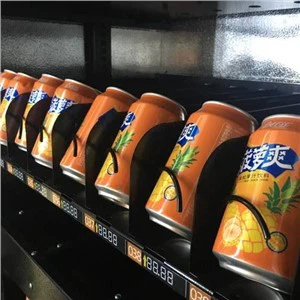Why are there so many vending machines in Japan?
How many vending machines are there in Japan? According to the statistics of the Japan vending machine industry association, at the end of 2007, the number of all kinds of vending machines in Japan was 5405300 - an average of less than 30 people have one. This figure is amazing.
What do vending machines in Japan sell? Before answering this question, we must first make clear what the concept of "vending machine" is in Japan. The concept of "vending machines" in Japan is broader than that in other countries. In addition to selling tangible things for their own work, they also sell "services". This kind of "service" includes changing money (changing zeros, changing zeros for zeros), renting video tapes and even coin operated small pieces access boxes at stations. However, the bank's ATMs are not included in the statistical scope. Therefore, after deducting the "automatic service machines", only 4.2 million units are actually sold, which is also the data of an average of 30 people per unit.
Most of the vending machines in Japan sell beverages. There are 2.3 million sets of cool drinks alone. In addition, there are 2.6 million sets of coffee, milk and alcohol, about half of which are cigarettes and food. In addition, there is a mess of everything, from tickets to stamps, newspapers to adult magazines, condoms to menstrual cotton, I can hardly find anything that I can buy without an automatic vending machine.
There is a reason why vending machines are so popular in Japan. The vending machine itself appeared very early. It is said that around 215 BC, it appeared in the temple in Alexandria, Egypt. It was designed by hero and used the lever principle to sell the "divine water" that flowed from the time when the weight of coins was put in to make the container tilt to reset.
(the unmanned gas station is actually an automatic vending machine)
Although it has such a long history, the real application of vending machines will be after the industrial revolution. It is generally believed that a postcard selling machine that appeared in London in 1880 was * * a coin driven vending machine. The machine for selling gum set up by Cadbury Adams on the train platform in Parsippany, New Jersey, in 1888 was * * vending machines in the United States. In the same year, the cigarette vending machine invented by Takashi Toyoda also appeared in Japan. The stamp vending machine made by Toyoda in 1904 is still preserved in the "letter delivery comprehensive museum" as an existing * ancient vending machine. In fact, eight months before Toyoda's invention, a man named Hideki Ono had already obtained the No. 848 patent with the idea of "vending machine".
The use of vending machines is different from the use of other machines. In addition to the economic benefits that the use of vending machines can help the seller save labor costs and bring convenience to consumers, more social consensus is needed. First of all, we need reliable electromechanical technology. The party using the vending machine to sell goods must have sufficient assurance that what can be recycled is real money. On the contrary, customers can only use the vending machine after they believe that they can certainly take out the goods they want after they have invested the money. The author once used a coffee vending machine in Pudong Airport, but after finding that there was no response after the money was invested, he had to take self-defense measures without asking the vending machine for help. Secondly, there should be a good social security order to ensure that the vending machine in the unmanned environment will not be damaged by people.

Japan happens to have these needs and conditions at the same time. First of all, Japanese labor is extremely expensive. It is better to buy a machine instead of paying for people. Just turn on the electricity. You can work for hours a day without eating or drinking. The Japanese work long hours and come home late from work. Ordinary stores cannot open for such scattered needs because the sales are not enough for the operating expenses. Vending machines can well meet this social demand. Japan's high-quality Electromechanical industry can provide various reliable vending machines for various commodities, and Japan's good social security also ensures that the vending machines in the outdoor unmanned environment will not be damaged.
But these are relative. Japan's vending machine system is not * * no problem, just a few. In fact, the crime of vending machines and crime prevention in Japan have never stopped. There is money in the vending machine, and it is cash. This is * to attract the attention of criminals. In the early 1990s, it was found that the high frequency emitted by the BB gun (stun gun) for women's self-defense could make the coin recognition device inside the vending machine malfunction, so someone took the BB gun and hit the vending machine everywhere. Once, when the police investigated the reasons of two suspicious people on the road, they found that they actually carried 18 kg coins - except for robbing the vending machine, the police could not think of any reason for a person to carry 18 kg coins on the road. Of course, this loophole was immediately closed. Now they can't compete with each other with a BB gun against the vending machine.





